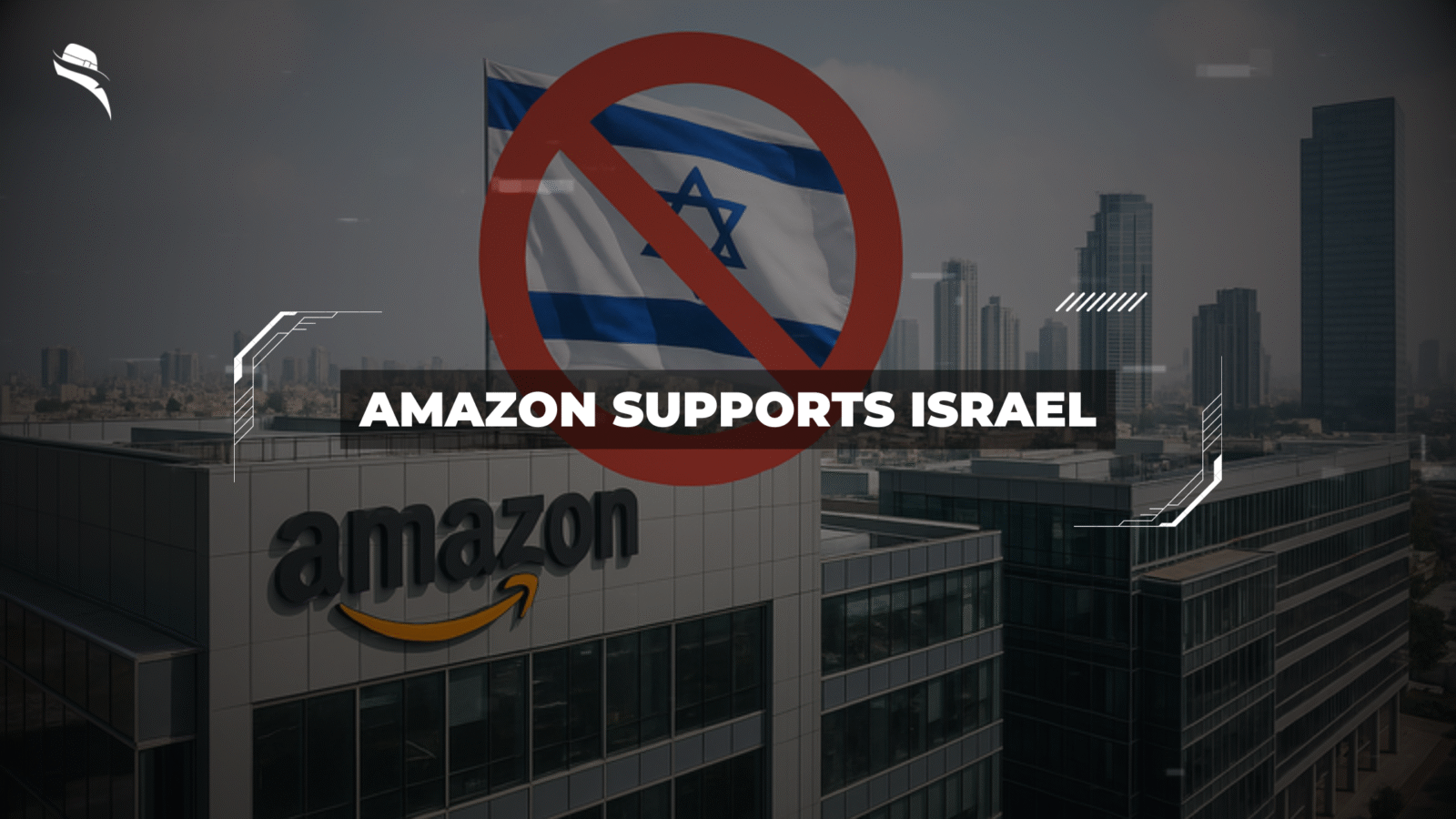Amazon supports Israel through a landmark cloud services agreement worth over $1 billion, signed with the Israeli government in 2021. This major deal, which also includes Google, aims to provide comprehensive cloud services for Israel’s public sector and military operations.
Under this agreement, known as Project Nimbus, which began in 2019, Amazon Web Services (AWS) and Google will develop cloud infrastructure while helping formulate government migration policies, integration strategies, and optimization protocols. Moreover, both tech giants have committed to reciprocal purchases and industrial cooperation equivalent to 20% of the contract value. According to government procurement documents, two of Israel’s leading state-owned weapons manufacturers are required to use Amazon and Google for their cloud computing needs. In fact, Amazon announced plans to open six data centers in Israel by 2023, with each center expected to provide approximately 500 direct jobs.
Amazon supports Israel: A Strategic Partnership
The strategic relationship between Amazon and Israel solidified in 2021 when Amazon Web Services (AWS) and Google secured the Project Nimbus contract through a competitive bidding process, beating out Microsoft and Oracle. This partnership represents a significant milestone in Israel’s technological infrastructure development.
Amazon Israel ties through Project Nimbus
Project Nimbus establishes a framework that transforms how Israel’s government agencies access cloud technology. Worth approximately $1.2 billion, this multi-year contract includes stringent protective measures for Israel. Specifically, the agreement contractually forbids Amazon and Google from halting services due to boycott pressure. Furthermore, the tech companies cannot deny service to any particular entity of the Israeli government, ensuring continuity regardless of political circumstances.
Scope of cloud services provided
In August 2023, Amazon launched its AWS Israel (Tel Aviv) Region, consisting of three Availability Zones. This infrastructure allows customers to run workloads with enhanced availability, performance, security, and scalability while ensuring data remains securely stored within Israel’s borders. The scope of services includes artificial intelligence capabilities, machine learning, and comprehensive cloud computing infrastructure.
Amazon announced plans to invest approximately $7.2 billion in Israel through 2037. This investment is projected to contribute an estimated $13.9 billion to Israel’s gross domestic product and support over 7,700 full-time jobs annually in the local economy.
Mandatory use by government agencies
The Project Nimbus contract established mandatory cloud service usage for numerous Israeli entities. As specified in government procurement documents, if these organizations need cloud services, they must purchase them from the winning bidders. These obligatory customers include:
- The Ministry of Defense and Israel Defense Forces (IDF)
- Bank of Israel
- Israel Airports Authority
- Settlement Division
- State-owned arms manufacturers, including Israel Aerospace Industries and Rafael Advanced Defense Systems
Essentially, this arrangement creates what Israeli officials describe as “a comprehensive response to the provision of cloud computing services for the Israeli government, including the general national security array”. Any government office seeking to use alternative cloud providers must petition for explicit exemptions from oversight committees.
Military and Defense Applications
Beyond providing general cloud infrastructure, Amazon’s services directly support Israel’s military operations. The Israeli Defense Forces (IDF) extensively utilize AWS to store surveillance information on Gaza’s population, with military intelligence sources describing the exponential capacity as enabling “endless storage” for intelligence on “everyone” in Gaza.
Use by the Ministry of Defense and the IDF
Since October 2023, the Israeli military has dramatically increased its purchase of services from AWS, Google Cloud, and Microsoft Azure. Military officials consider cloud services a “game changer” for rapidly identifying targets. Data stored on Microsoft servers doubled to more than 13.6 petabytes by July 2024, approximately 350 times the digital memory needed to store every book in the Library of Congress. The IDF initially moved systems to the cloud after their internal networks crashed from user overload during military operations.
Involvement of arms manufacturers
Two state-owned Israeli weapons manufacturers—Israel Aerospace Industries and Rafael Advanced Defense Systems—are contractually required to use Amazon and Google cloud services through Project Nimbus. These companies produce many of the weapons deployed in Gaza. Though procurement documents don’t specify exactly which cloud services these arms makers must purchase, Rafael announced it had begun transitioning certain “unclassified” cloud functions to AWS.
Palantir and third-party defense tools
Additionally, Project Nimbus establishes “digital marketplaces” where Google provides access to third-party tools like Palantir’s Foundry data analysis platform. The Israeli military extensively uses Palantir software for targeting operations in Gaza. Other AI-powered systems include “Lavender,” which generates targeting lists based on civilians’ phone contacts and social media activity, and “Where’s Daddy,” which alerts when targets enter family homes. As Colonel Racheli Dembinsky from the IDF stated, working with tech companies has granted the military “very significant operational effectiveness”.
Ethical Concerns and Employee Protests
“The technology our companies have contracted to build will make the systematic discrimination and displacement carried out by the Israeli military and government even crueler and deadlier for Palestinians.” — Anonymous Google and Amazon employees (open letter), Collective of Google and Amazon employees protesting Project Nimbus
Project Nimbus has sparked significant opposition from employees within both tech giants. In October 2021, a coalition of Google and Amazon workers published an open letter condemning their employers’ involvement with Israel. Subsequently, more than 90 Google employees and 300+ Amazon staff signed protest letters internally.
Internal dissent at Amazon and Google
Employee activism escalated dramatically in April 2024 when Google fired 28 workers following protests against Project Nimbus. This mass termination represents one of the largest in the tech industry related to Israel’s military actions. Previously, in March 2024, Google dismissed another employee who disrupted an Israeli tech event. Nevertheless, employee resistance continues growing, with organizers claiming over 200 Google workers are actively involved in the “No Tech for Apartheid” movement.
Human rights concerns from NGOs
Beyond worker protests, numerous human rights organizations have raised alarms. In April 2025, the Business & Human Rights Resource Centre invited Amazon to respond to allegations about potential complicity in the mass surveillance of Palestinians, but the company remained silent. Human rights experts have repeatedly highlighted that neither Google nor Amazon has publicly disclosed what human rights due diligence they conducted before participating in Project Nimbus.
Corporate responses and public statements
Despite mounting criticism, both companies have maintained minimal engagement. When questioned about Project Nimbus, Amazon typically issues boilerplate responses stating it provides technology to customers “wherever they are located”. Conversely, Google claims its services aren’t directed at “highly sensitive, classified, or military workloads”. However, as one defense source revealed, most new contracts between the military and cloud companies since the war began have been realized through the Nimbus tender.
Global and Political Implications
The Amazon-Israel partnership through Project Nimbus extends far beyond a business agreement, reaching into complex global politics and corporate ethics.
Impact on Amazon’s global image
Amazon faces mounting reputational challenges as employees organize against Project Nimbus. The “No Tech for Apartheid” movement now includes over 200 Google employees actively organizing, alongside hundreds at Amazon. Consequently, shareholders have filed resolutions warning that “employee and public opposition to such contracts will increase and pose a risk to Google’s reputation and its strategic positioning on social responsibility”. These shareholders collectively own approximately $1.8 million in shares.
Geopolitical tensions and tech diplomacy
Technical experts have raised alarms about broader implications. One researcher noted, “Our legal and technical frameworks are not prepared for this type of AI-based warfare”. Particularly concerning is that while export controls exist on specific AI-enabling technologies, there is “no wholesale ban on AI military technology specifically”. International human rights experts increasingly view these technology partnerships as extending beyond simple business relationships, potentially making companies “complicit and directly enabling” actions that could be categorized as war crimes.
Calls for transparency and accountability
Advocacy groups demand that both companies:
- Disclose what human rights due diligence they conducted
- Explain how they ensure technologies aren’t facilitating rights violations
- Honor their commitments to international human rights standards
Ultimately, critics argue that these companies’ public commitments are meaningless without verification mechanisms.
For a broader look at how global tech companies are shaping Israel’s digital infrastructure, read our main piece: Tech Companies That Support Israel
Final Thoughts
As technology increasingly intertwines with geopolitics, Amazon’s involvement in Israel highlights complex questions about corporate responsibility in conflict zones. The magnitude of this partnership—with Amazon’s planned $7.2 billion investment through 2037—marks it as more than just another business venture.
What makes the Amazon-Israel relationship particularly noteworthy is how it demonstrates the evolving role of cloud infrastructure as critical national security infrastructure. Unlike traditional defense contracts, cloud services provide ongoing, evolving capabilities that expand over time rather than delivering discrete products.
This case undoubtedly establishes a precedent for how major tech companies might engage with governments worldwide. The contractual protections Amazon secured against boycott pressures reveal a sophisticated approach to managing political risks while maintaining business continuity.
Yet ultimately, this partnership illustrates the increasingly blurred boundaries between commercial technology and military applications. Indeed, as cloud infrastructure becomes fundamental to modern warfare and surveillance, tech companies face difficult choices about their role in global conflicts.
The debate around Amazon’s Israel ties will likely continue evolving as stakeholders weigh economic benefits against ethical considerations. Meanwhile, this partnership demonstrates how cloud computing has become central not just to business innovation but to geopolitical strategy, challenging traditional notions about technology’s neutrality in complex international relations.
FAQs
1. What is Amazon’s Project Nimbus with Israel?
Project Nimbus is a $1.2 billion contract signed in 2021 between Amazon (AWS), Google, and the Israeli government. It provides cloud infrastructure and artificial intelligence services to Israel’s public sector and military.
2. How is Amazon involved with Israel’s military operations?
Under Project Nimbus, Amazon Web Services (AWS) provides cloud services to the Israeli Ministry of Defense and IDF, storing surveillance data and supporting AI-based military operations in Gaza.
3. Why is Amazon being criticized for its partnership with Israel?
Amazon faces criticism for enabling surveillance and military targeting in Gaza through its cloud services. Human rights groups and employees argue that AWS technologies are used in potential violations of international law.
4. Which Israeli organizations are required to use Amazon’s cloud services?
Entities like the Ministry of Defense, IDF, Israel Aerospace Industries, and Rafael Advanced Defense Systems are contractually obligated to use Amazon and Google’s cloud services through Project Nimbus.
5. Has Amazon built data centers in Israel?
Yes. Amazon launched the AWS Israel (Tel Aviv) Region in August 2023, with six planned data centers expected to provide around 500 direct jobs and support national cloud infrastructure.
6. What role does AWS play in Israel’s surveillance programs?
AWS enables large-scale data storage and analysis, allowing Israeli intelligence and military units to gather and manage surveillance data on Gaza’s population, raising serious privacy and ethical concerns.
7. Are Amazon employees protesting the company’s work with Israel?
Yes. Hundreds of Amazon and Google employees have joined the “No Tech for Apartheid” movement, protesting their employers’ involvement in Project Nimbus and calling for contract termination.
8. How much is Amazon investing in Israel long-term?
Amazon has announced plans to invest approximately $7.2 billion in Israel through 2037, which could contribute an estimated $13.9 billion to Israel’s GDP.
9. Is Amazon facing backlash for not disclosing human rights due diligence?
Yes. NGOs and advocacy groups have criticized Amazon for failing to publish any human rights due diligence regarding Project Nimbus and its impact on Palestinian civilians.
10. How does Project Nimbus impact Amazon’s global reputation?
The partnership has sparked global protests, employee dissent, and shareholder concerns, placing Amazon at the center of debates over tech ethics, military complicity, and corporate accountability in conflict zones.







3 Comments